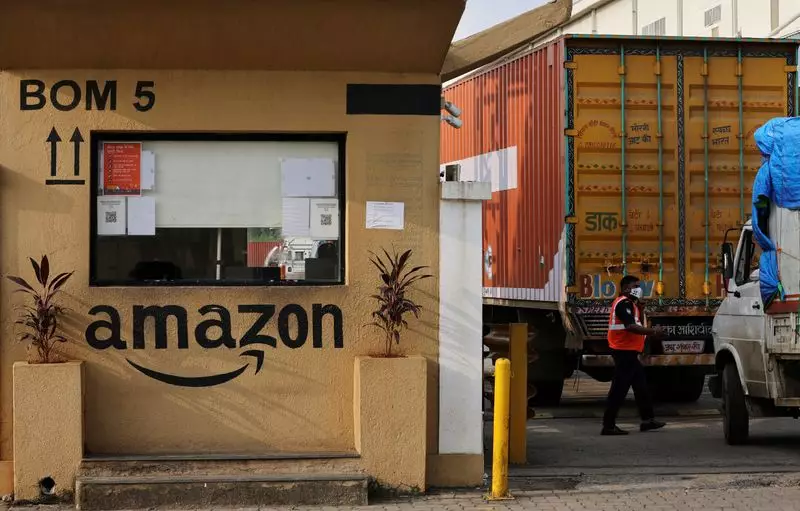The rapid growth of India’s e-commerce sector, now valued at an astounding $70 billion, has inevitably drawn the attention of regulatory bodies, particularly in the context of foreign investments. Major players like Flipkart and Amazon have been at the forefront of this market expansion but are facing increasing scrutiny from India’s enforcement agencies. Recent developments signal a tangible shift in government attention towards these companies, particularly concerning allegations of violating foreign investment laws. An investigation led by India’s Enforcement Directorate has recently been making headlines, following raids conducted on various sellers associated with these e-commerce giants. The implications of these actions not only highlight the government’s commitment to upholding market regulations but also signify deepening tensions between large foreign enterprises and local governance frameworks.
At the heart of the Enforcement Directorate’s investigation are serious claims that Flipkart and Amazon have unlawfully exercised control over the inventory of goods they sell, which contradicts Indian regulations prohibiting foreign e-commerce entities from holding such inventory. Instead, these companies are mandated to function solely as intermediaries between sellers and buyers. Despite both companies asserting that they operate within legal confines, the investigation suggests otherwise, as evidence has emerged pointing to preferential treatment of select sellers—a breach of antitrust regulations. Indian law is clear: foreign players are not allowed to directly control inventory, positioning marketplace sellers as the true ownership entities.
On the heels of the enforcement raids, reports have emerged that executives from these companies are being summoned for questioning. This marks a crucial tactical approach by the Directorate as it delves deeper into the transactions and relationships the e-commerce platforms have maintained with their sellers over the past five years. The weight of these allegations is compounded by the fact that the e-commerce sector accounts for a significant fraction of the overall retail market in India, intensifying the stakes for both the local economy and international stakeholders.
A notable aspect of this developing saga is the market share held by Flipkart and Amazon, estimated at 32% and 24% respectively. The strategies employed by these companies to dominate the e-commerce landscape have raised eyebrows, especially in light of findings that characterize them as exerting “end-to-end control” over inventory via select sellers. This model has raised serious ethical and legal questions concerning fair competition in the industry and the treatment of smaller domestic players who often find it challenging to compete on an uneven playing field.
Furthermore, internal investigations have revealed that Amazon, for instance, had closely cultivated its relationships with certain sellers, providing them with favorable terms that were not extended to others. The case of Appario, a notable seller that enjoyed special privileges from Amazon, starkly illustrates the systemic issues at play in the Indian e-commerce space. These revelations lend credence to the notion that some sellers are merely “name-lending” entities, a contravention of intended marketplace integrity.
As the Enforcement Directorate continues to sift through data and documentation collected during the raids, the potential outcomes of this investigation loom large. Should the claims of regulatory infringements be substantiated, the implications could be immense, not only for Flipkart and Amazon but for the overall landscape of e-commerce in India. Possible ramifications may include substantial fines, alterations in operational practices for these companies, and a reinforced stance from the Indian government regarding monitoring foreign investment practices.
Beyond the immediate legal consequences, this situation represents a pivotal moment for India’s regulatory environment. The scrutiny faced by these e-commerce giants is reflective of broader concerns regarding fair competition, the protection of consumer rights, and the safeguarding of small businesses. As complaints of unfair practices mount, the government’s rigorous approach in this case may well lay the groundwork for future regulatory frameworks governing the burgeoning e-commerce sector.
The increasing regulatory scrutiny of Flipkart and Amazon underscores a significant turning point for foreign investment in India’s burgeoning e-commerce market. With allegations of inventory control and preferential treatment hovering over these companies, the actions taken by the Enforcement Directorate illustrate a robust commitment to uphold fair market practices. The unfolding developments will likely serve as a harbinger for a new era in Indian e-commerce, one that prioritizes legality and fairness amidst an increasingly competitive landscape. As this investigation unfolds, it will be pivotal for both regulatory bodies and industry players to navigate the complexities of compliance and competition in a manner that fosters a sustainable and equitable market environment.

